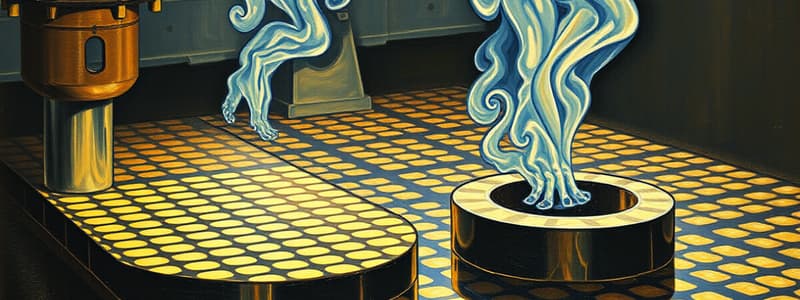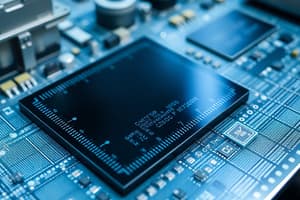Podcast
Questions and Answers
What is the primary purpose of diffusion in wafer fabrication?
What is the primary purpose of diffusion in wafer fabrication?
- To remove impurities from the silicon surface
- To introduce dopants into silicon to control majority carrier type (correct)
- To reduce the temperature of the silicon wafer
- To increase the size of silicon wafers
What are the two steps of the diffusion process?
What are the two steps of the diffusion process?
- Saturation and Ionization
- Predeposition and Drive-in (correct)
- Evaporation and Condensation
- Heating and Cooling
What factor does NOT affect the junction depth in diffusion?
What factor does NOT affect the junction depth in diffusion?
- Substrate Dopant Concentration
- Temperature
- Dopant Ion Dose (correct)
- Time
Which characteristic of ion implantation process is TRUE?
Which characteristic of ion implantation process is TRUE?
Which statement is true regarding the Drive-in step of diffusion?
Which statement is true regarding the Drive-in step of diffusion?
What is the primary outcome of lattice damage during ion implantation?
What is the primary outcome of lattice damage during ion implantation?
How does temperature impact junction depth during diffusion?
How does temperature impact junction depth during diffusion?
Which of the following factors in ion implantation controls the maximum concentration of dopants?
Which of the following factors in ion implantation controls the maximum concentration of dopants?
Flashcards are hidden until you start studying
Study Notes
Diffusion
- Dopants like boron and phosphorus are introduced into silicon to control the majority carrier type and resistivity.
- The process involves the movement of atoms from regions of high concentration to low concentration.
- Diffusion depends on temperature and time, comprising two main steps:
- Predeposition (Constant-Source Diffusion): Occurs with a continuous supply of dopants.
- Drive-in (Limited-Source Diffusion): Takes place after predeposition, where dopants already present are driven deeper into the silicon.
Junction Depth
- Junction depth is achieved when the concentration of diffused dopants equals that of the substrate.
- Factors increasing junction depth include:
- Elevated Temperature
- Extended Time
- Detailed calculation of junction depth is a topic in Advanced Wafer Fabrication Technology.
Ion Implantation
- Involves accelerating ionized dopants into the wafer's surface at high energy.
- Junction depth influenced by:
- Acceleration energy
- Substrate concentration
- Maximum dopant concentration in the wafer is determined by the dose of accelerated ions.
Characteristics of Ion Implantation
- Operates at low temperatures, allowing use of sensitive materials like photoresist and metal films as barrier masks.
- Capable of utilizing a wider range of impurity species compared to diffusion.
- Requires tight process control to ensure precision in doping.
- Ion impact can cause lattice damage by knocking atoms out of the silicon lattice, necessitating an annealing process to repair damage.
Studying That Suits You
Use AI to generate personalized quizzes and flashcards to suit your learning preferences.




